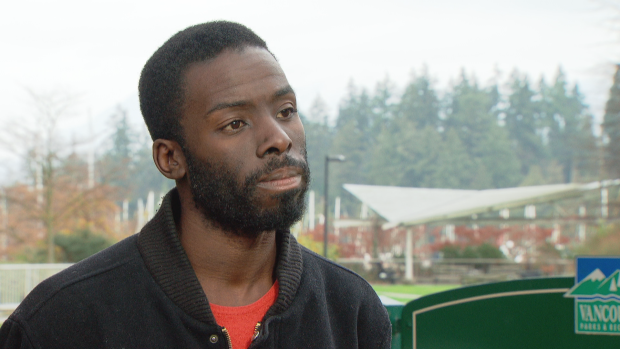Toronto anti-carding activist stopped by police in Vancouver

A Toronto activist known for his criticism of the controversial police practice known as "carding" claims he was stopped by an officer in Vancouver because he's black.
Desmond Cole was walking near Marina Square Park on Tuesday when a police officer in a car pulled over and told him he was breaking a city bylaw for smoking in a park. But Cole says he wasn't in the park — he was walking on the sidewalk.
The officer then repeatedly asked Cole for his name, he says, which he refused to supply.
"I believe that this police officer saw a black man in a hoodie walking down the street, and he thought he would have a good chance of being able to stop me, ask me whether or not I have any warrants out for my arrest, run my name through his database and otherwise just harass me and waste my time," Cole said.
"This has happened to me so many times. I'm very familiar with this kind of police activity and the kind of excuses that they use to trick you into giving your information."
Stopped for bylaw infraction: police
Cole is an outspoken critic of carding, also known as street checks — when officers stop, question and demand identification documents from people, even when they're not suspected of any specific crime.
Ontario limited the practice last year in an effort to curb systemic racism in the criminal justice system.
A Vancouver Police Department spokesperson said in a written statement Cole was stopped for a bylaw infraction, not a street check. Cole's information wasn't recorded, the spokesperson said. Ultimately, the officer opted not to give Cole a ticket.
"Our officers work through difficult situations every day and a key component of maintaining public safety is interacting with the public," Vancouver police said.
"VPD officers carry out their duties with integrity, compassion and respect and are accountable for their actions."
Policing 'should be free of bias': mayor
Mayor Kennedy Stewart said he has asked the Vancouver Police Department for more information about the incident.
He has also contacted the B.C. Civil Liberities Association and Cole to ask if they can speak directly.
"Policing in our city should be free of bias, and I will support any measures that help the VPD achieve this," Stewart said in a statement.
"One of those measures is the independent review ordered by the police board into street checks, and I look forward to seeing the results of that review this summer."
Cole says it's important for people to stand up for themselves, if they can, when faced with racism from police in order to stop discriminatory practices from happening in the first place.
"This is the kind of policing that is wasting our money and that is marginalizing people in our communities," he said.
Cole is in Vancouver to give a talk at the Canadian Centre for Policy Alternatives about black racism in Canada. He says he came a few days early to take some time off and relax, which he was planning to do in Stanley Park on Tuesday.
Instead, he spent most of the day thinking about his interaction with the police officer, he says.
"I was furious. I just wanted to go to the park," he said.
"I really had a hard time sleeping last night because I kept on replaying what happened to me over and over and over again in my head."
Police defend street checks
Earlier this year, the Union of B.C. Indian Chiefs and the B.C. Civil Liberties Association filed a complaint with the province's police complaints commissioner, based on data released under a Freedom of Information request.
The data shows that 15 per cent of all street checks conducted between 2008 and 2017 were of Indigenous people — yet they make up just two per cent of the population.
According to police data, four per cent of those checked were black, despite black people making up less than one per cent of Vancouver's population.
The VPD defended street checks and argued that officers don't arbitrarily card people.
Tom Stamatakis, president of the Canadian Police Association and the Vancouver Police Union, defended the practice of checking people in the community.
"These are checks that are conducted for a specific police purpose or a public safety purpose and it's driven by the actions of the individual," Stamatakis said.
"There are many good reasons for doing that."
Race and ethnicity are never the reason for any interaction with a member of the public, Stamatakis said.
With files from Micki Cowan

